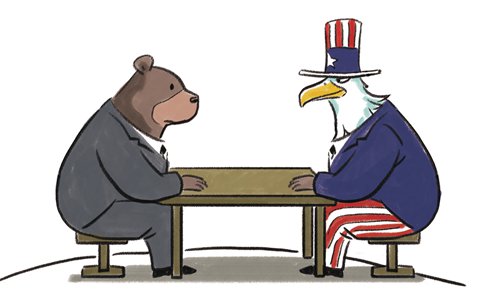President Donald Trump's efforts to improve US-Russia relations have been under attack since he took office. The reasons for the Establishment taking on Trump now are for everyone to see.

Illustration: Liu Rui/Global Times)
During his presidential campaign, Trump said that he would work to improve relations between Washington and Moscow. He believed this was in the national interest because ties had fallen to new lows and tensions had skyrocketed. A new Cold War seemed imminent.
Trump is a pragmatic businessman who is used to dealing at the top with CEOs. So it should be no surprise that his diplomatic style as president is to emphasize meetings with fellow leaders of major powers.
As a businessman, his style is transactional. He likes to negotiate, to solve problems, and to get results. A good business deal benefits both sides and this entails a win-win attitude. US presidents have met with Soviet and Russian leaders for decades. Franklin Roosevelt met Stalin. Richard Nixon pursued détente. There is nothing new in a US president seeking cooperation with Moscow to benefit both sides.
Reduction of tensions and peaceful relations between nuclear powers benefit the world.
Negotiations, and not confrontation, are the best way forward.
The Trump-Putin summit addressed a number of key issues. Rather than only atmospherics, there was substantive discussion on a range of topics. These difficult issues include nuclear proliferation, trade, cyber security, Ukraine, North Korea, and Middle East peace.
The agenda was ambitious but timely and relevant to pressing international issues. The atmosphere was not only businesslike but friendly. Trump himself said they got along well.
So why is there such a vicious attack against Trump for his Russia policy by US politicians and mainstream media?
The simple reason is that the US Establishment rejects major power cooperation because it seeks the continuation of Western hegemony.
President Putin has said all along that Russia is prepared to have cooperative relations with the US.
Chinese President Xi Jinping suggested in 2013 that major powers undertake a new type of relationship on a win-win basis.
Cooperation by the major powers on pressing global issues is in line with the changing international system. The bi-polar Cold War era ended in 1989 as a result of the direct diplomacy of Ronald Reagan and Mikhail Gorbachev.
Today, a multipolar and pluralist system is evolving. Trump rightly wants to adjust US foreign policy to the changing times. He plainly stated this in his campaign, so there should be no surprises.
The perspective of the transatlantic oligarchy which includes the US and European Establishments sees things differently. The "Atlanticists" after WWII created a Western fortress backed by its NATO military machine.
The strategic objective of the Western fortress is to impose capitalism globally. Alternative economic models are not welcome. The neoliberal "Washington Consensus" model is to be the world standard.
The Atlanticists seek to transform the former Cold War bipolar bloc confrontation into a new bipolar dispute. So today they push a geopolitical concept of a democratic bloc versus the so-called non-democratic bloc.
The Atlanticists' hegemonic vision is in direct opposition to Trump's desire to promote major power cooperation on a multipolar basis.
Trump's bold initiative to meet Putin at the Helsinki summit predictably triggered the unprecedented and savage attack on his policy of rapprochement with Moscow.
Because the Deep States in the US and Europe serve the Atlanticists, their opposition is not unexpected. Because the US mainstream media serves the Atlanticists, its hysterical attack shouldn't as well surprise.
Polling data in the US shows that the American people favor peace and development.
Trump's invitation to Putin to come to the US for a follow-up working summit is an excellent move. Washington and Moscow must cooperate on key global issues and must reject confrontation.
The author is an educator and former senior professional staff member of the Senate Committee on Foreign Relations.
(Source: Global Times)


